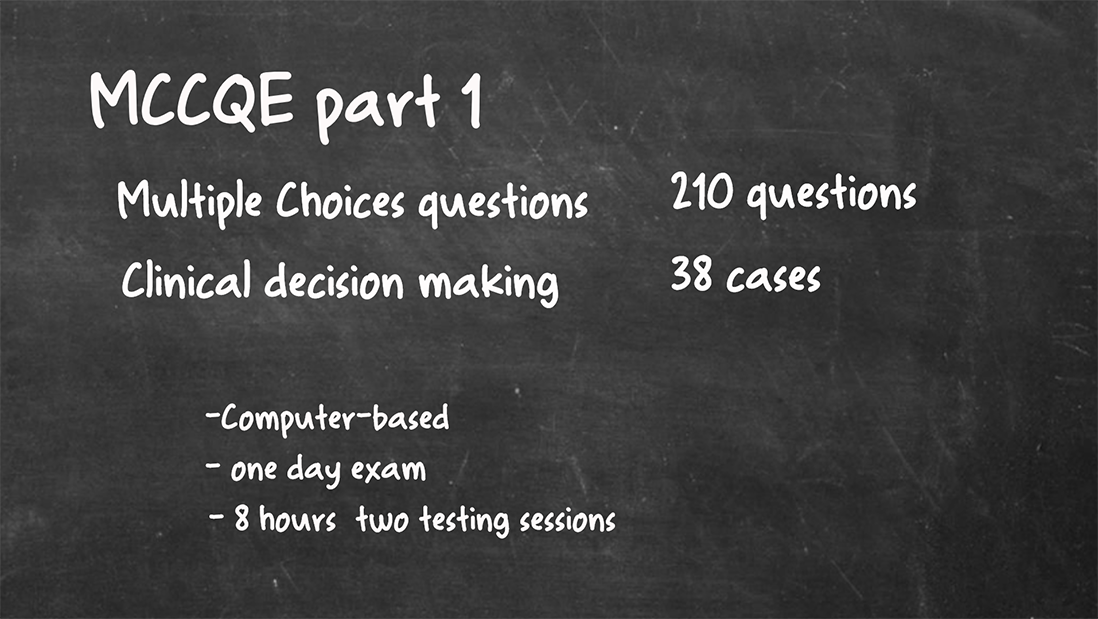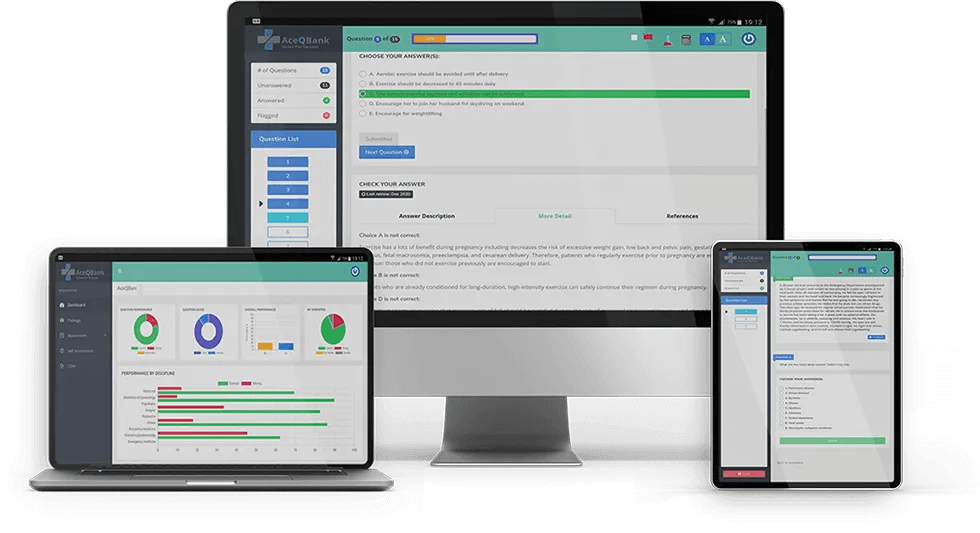Outline of MCCQE Part 1 Exam

The Medical Council of Canada Qualifying Examination (MCCQE) Part 1 is a significant step in becoming a certified physician in Canada. It is justifiably considered one of the most difficult examinations in the world. It is critical to comprehend this exam in order to pass it.
Medical students and international medical graduates (IMGs) commonly believe that a good MCCQE part 1 score can be obtained with only one to two months of consistent preparation. The reality, on the other hand, is quite the contrary.
Exam preparation for MCCQE part 1 differs from any other exam you have taken in medical school in many ways. The MCCQE part 1 exam is more comprehensive, broader, and more challenging because it involves more content and covers more topics. Thus, the preparation for MCCQE 1 exam calls for a different approach.
The MCCQE part 1 exam clearly takes a great amount of time, effort, and money to develop. The test items are not just questions to be answered; they are problems to be solved. The test is your adversary and you are not competing against other candidates; the exam is what you are up against.
MCCQE 1 exam doesn’t test mere recall of facts. The exam tests candidates on their ability to think critically, use clinical knowledge and information from the presented clinical case to solve clinical problems rather than recall facts. A clinical senior must be accurately diagnosed, managed, and treated with the help of the information you obtain based on current Canadian guidelines, recommendations, and clinical knowledge; therefore, a good knowledge base is essential.
Read more on the MCCQE 1 exam preparation guide
Here in this article, we will attempt to explore the MCCQE part 1 exam in-depth and go through the exam in detail so you know all there is to know about the exam format, key components, score, and what to expect on exam day:
What is the MCCQE 1 exam?
The Medical Council of Canada Qualifying Examination (MCCQE) Part 1 exam is a computer-based, one-day exam with two parts that assess your medical knowledge and clinical decision-making ability after completing your medical school and getting your medical degree. This exam objective is to judge your abilities to work as a medical professional in our beloved country, Canada. The MCCQE 1 exam is based on the Medical Council of Canada (MCC) objectives.
These objectives show the Medical Council of Canada‘s expectations from the future medical professional of Canada. The MCC objectives are essential to your preparation for the exam and help you later on in your career. Besides, Knowing these goals will allow you to organize your studies better and develop a more successful plan for the MCCQE 1 exam.
Ace Qbank is Canada’s only question bank designed based on the MCC objective, with a focus on providing high-quality clinical vignettes and including the most recent updates and Canadian guidelines. Ace Qbank also offers self-assessments and high-yield CDM cases. Self-assessments are designed based on the MCC objectives to provide accurate assessment and a simple guide of areas that require your attention and need to be strengthened before your actual exam.
Format for the MCCQE part 1
In most cases, students appear for the MCCQE 1 exam while they are in the process of finishing their medical degrees. MCCQE 1 exam is a computer-based exam. It comprises two components – the first being the ‘Multiple Choice Questions’, and the other one is the ‘Clinical Decision Making’ component. Both components are covered on the same day in two sessions. In the morning session, which is 4 hours long without a break, your medical knowledge will be tested with 210 MCQs. You will have to select the correct answer from five choices. The afternoon session is reserved for the CDM session, which is three and a half hours and set to access your ability of clinical decision-making. CDM consists of 38 cases which have 1 – 4 questions per case.
The Multiple-Choice Questions (MCQ) Component
MCQ is the first component of MCCQE1. The total number of questions is 210, but 35 are pilot and don’t affect your final score. The pilot questions are not identified in the test. So it would be best if you did every question in the exam. Each of the MCQs has five options to choose from, out of which only 1 is correct. The maximum time allocated to complete this component.
All the MCQs will be available to see on the computer in a single block. You can move from one to another freely, both up and down ways from the list. You can flag any question for review if you are unsure about it and then return to it anytime during the exam’s time limit. Some questions are containing pictures, x-ray and ECG pictures, etc., requiring you to study them to answer the question. Normal lab values will also be provided in the question itself if necessary for the question.
For answering the question, just click on the option you choose to be the correct answer. If you made a mistake and want to change your answer, just click on the different option. There is no negative score for an incorrect answer, so you should answer all the questions even if you are not sure about it. After completing the 4-hour time duration of the MCQ component, you have to submit your answers to the system. Be sure that you have answered all the questions before submitting them, including the ones you have flagged, as it is impossible to make any changes after this.
Clinical Decision-Making (CDM) Component
CDM component of the MCCQE 1 exam comprises 38 case scenarios, and each of them has some questions based on them. This case description checks the decision-making abilities of the examinee under various critical situations. You have to provide your decision in areas like diagnosis, prescription, eliciting information, etc., in such a way that it reflects real patients. The total number of questions ranges from 60 – 70 among all 38 cases, and the format of the question may be in short write-in answers or a quick menu. The allotted time for this component is 3.5 hours. Of the 38 CDM cases, 8 are pilot cases that have no value in your final score. However, again the pilot cases are not identified in the exam.
Again here also, the case descriptions and their questions are accessible in a single block on your computer screens. You can navigate through these questions anyway and at any time during the exam. As with the MCQ questions, you have access to normal lab values.
There is no negative marking for incorrect answers in this component also, so try to answer all the questions within the time limit. If you give more responses than the allowed number, you might get a nil score for the answer. So answer all the questions as well as you can before clicking the submit button. You will not be allowed to change your answers after submitting them.
Short-Menu Questions
As discussed above, the CDM components of the exam consist of short menu questions. In this type of question, you are given 10 – 30 options for the answer, unlike MCQ questions with only five options. You may be asked to select one or more options from the given menu. You may be given a specific number of options to be chosen, a maximum number of options that you can choose, or asked to choose as many options as you seem are correct.
Write-in Questions
As the name suggests, you are supposed to write your answers to these questions. You will be scored based on the quality of your answer here. You should follow certain rules to get the maximum score in this type of CDM question.
Don’t type more than one response in one box provided for typing. Suppose you are asked to write 4 diagnoses for a CDM scenario, you will be given 4 boxes to write one answer in each. If you write more than one answer in any box, you will not get any marks for that. Your responses should be specific, and you should use proper medical terminology in answering the questions. You cannot write thyroid disease in place of ‘hyperthyroidism’ and expect to get good marks.
Don’t write specific names of drugs and medicines in the answers. Preferably use generic names. Read the questions carefully to check if you are just required to give only names or whether you are required to state the dosage and drug administration process. Word your responses cautiously. Keep your answer concise to a single word or single phrase.
Follow Instructions
The clinical cases come with a set of instructions specific to them. It is your job to read and understand them completely and follow them in your answer. For instance, if a question requires you to give a specific number of responses, do not exceed it. If you don’t follow it, you will not get any score for the answer, even if your answer has one or more correct responses.
In some clinical cases, you will be given a maximum limit of responses to choose from the given ones. You should only select the correct ones even if they are less than the limit. Suppose there are 3 correct responses to the given condition with a maximum limit of 5 responses, but you select five responses, including 3 correct ones but 2 incorrect responses. In this scenario, you may get no score even for the correct responses. On the other hand, if you select a wrong investigation or treatment, which could be harmful to the patient and correct answers, you will get no score.
Some questions don’t have a limit on the number of responses you can provide. In this case, you have to decide how many responses are correct. If you have selected excessive responses than necessary, you will get a zero score because excessive responses mean you are unsure of the correct investigation and treatment.
Know What Counts as an Answer
To get a good score on an answer, you should know what counts as one. As discussed above, you should follow the instructions in the question in the exact specific way. If the CDM question requires you to provide only a single response, never write more than one else; it might result in nil marks for the answer. To give you an example, if you write ‘airway assessment’, it will be counted as 1 answer, but you write ‘airway, breathing, circulation, it will be counted as three separate answers.
If you write vague terms that don’t give specific answers, it will be considered incorrect unless you also provide the meaning of the terms. If you have explained the terms, you will be scored. For example, the term ‘extended electrolytes’ in an answer will not be satisfactory. You will need to write ‘magnesium, calcium, phosphorus in the answer.
Read more about the insight into the MCCQE 1 exam
Scoring System Of The Exam
The MCC recommends a minimum passing score for the MCCQE part 1 exam. Currently, the passing score for MCCQE 1 exam, as set by the MCC, is 226. Your final score will be the total of both the MCQ and CDM sections of the exam. All the MCQ section questions carry 1 mark each, but the questions in the CDM section vary in marks depending on the type of question and the number of elements in the answer. The final score depends on individual marks and the degree of difficulty.
A passing score of 226 corresponds to answering 60-70 percent of the questions correctly, and upon passing your MCCQE 1 exam, you’ll receive a three-digit score of your MCCQE 1 exam in your physician apply account.
The graphical profile that appears on the back of your individual MCCQE 1 exam score report is provided as an assessment tool for your benefit. These profiles highlight the relative strengths and weaknesses of your performance for personal assessment. ACE Qbank self-assessment features the same functionality.
The MCCQE 1 exam does not have a “curve,” thus there are no percentiles. The test is your opponent; there is no competition with other students; it is the test you are competing against. The scoring standard for the MCCQE part 1 exam is fixed and does not alter throughout the year. Some people believe that results are calculated by comparing those of students who take the exam in the same month, but this is simply not true.
Need Help With Preparation For The MCCQE1 Exam
Proper preparation is essential for success on the MCCQE1 exam, and you should make every effort to earn the maximum possible score on the MCCQE1 exam. If you’re having trouble keeping to your study plan or if certain objectives are challenging for you, get the help you need to pass the MCCQE1 exam on the first attempt.
Ace Qbank has your back with over 2400+ high-yield questions, many Clinical Decision-Making (CDM) cases, and several self-assessments available to challenge and push you to your limit.
To prepare for the MCCQE1 exam, we developed the Ace Qbank based on the Medical Council of Canada (MCC) objectives. Our team reviews the question bank regularly based on current guidelines and recommendations, and we implement any changes we make as soon as possible to enhance your learning experience. Our objective is to keep the information up to date and in compliance with medical standards of care to avoid surprises during the test. At Ace Qbank, we’ve got you covered.
We invite you to sign up for the Ace Qbank demo today and see the difference our elite question bank makes!



